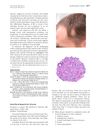 4 citations,
October 2016
4 citations,
October 2016 Herbs like aloe vera and amla are effective and safe for treating hair loss.
 8 citations,
February 2020 in “Aesthetic Surgery Journal”
8 citations,
February 2020 in “Aesthetic Surgery Journal” Adding cells to fat grafts improves hair regrowth in early baldness, but effects lessen over time.
 October 2023 in “Biomaterials”
October 2023 in “Biomaterials” Nanotechnology could improve hair regrowth but faces challenges like complexity and safety concerns.
 18 citations,
April 2013 in “Inflammatory Bowel Diseases”
18 citations,
April 2013 in “Inflammatory Bowel Diseases” People with Inflammatory Bowel Disease often lose hair due to stress, medication side effects, or lack of nutrients, and treatment depends on the specific cause.
 1 citations,
October 2023 in “Dermatology and therapy”
1 citations,
October 2023 in “Dermatology and therapy” Some treatments for severe hair loss work but often have side effects, with baricitinib showing the most promise.

IL6 is linked to higher risk of heart disease in people with a certain mouth condition.
 5 citations,
January 2023 in “Journal of the European Academy of Dermatology and Venereology”
5 citations,
January 2023 in “Journal of the European Academy of Dermatology and Venereology” Experts advise using sunscreen and proper skin care before, during, and after procedures to speed healing, prevent complications, and reduce scarring.
 July 2023 in “IntechOpen eBooks”
July 2023 in “IntechOpen eBooks” New treatments for alopecia areata show promise, but more research is needed to confirm their effectiveness.
 January 2024 in “Journal of advanced research in Medical and Health science”
January 2024 in “Journal of advanced research in Medical and Health science” People with severe and long-lasting alopecia areata often have low vitamin D levels, and treatments with vitamin D-like substances might help.
 July 2018 in “Elsevier eBooks”
July 2018 in “Elsevier eBooks” New hair loss treatments show promise, but more research is needed to confirm their effectiveness.
 164 citations,
April 2008 in “Cochrane library”
164 citations,
April 2008 in “Cochrane library” Current treatments for alopecia show no significant long-term benefits.
 May 1991 in “Current problems in dermatology”
May 1991 in “Current problems in dermatology” Skin issues can indicate immune system problems.
 January 2000 in “Expert Opinion on Therapeutic Patents”
January 2000 in “Expert Opinion on Therapeutic Patents” The document highlights various patents for new compounds with potential treatments for multiple diseases, including cancer, hormonal disorders, and diabetes.
 27 citations,
October 1999 in “Experimental and Molecular Pathology”
27 citations,
October 1999 in “Experimental and Molecular Pathology” Stump-tailed macaque best for researching hair loss causes and treatments.
 January 2007 in “Elsevier eBooks”
January 2007 in “Elsevier eBooks” Alopecia areata is a reversible, autoimmune-related hair loss that can have significant emotional impact and uncertain treatment effectiveness.
 14 citations,
February 2021 in “Journal of the European Academy of Dermatology and Venereology”
14 citations,
February 2021 in “Journal of the European Academy of Dermatology and Venereology” A COVID-19 patient with severe hair loss did not improve with hair loss medication after stopping and restarting it due to the infection.
2 citations,
March 2017 in “JAAD case reports” Oral alitretinoin can quickly regrow hair in alopecia universalis.
 5 citations,
April 2015 in “HSOA journal of clinical dermatology & therapy”
5 citations,
April 2015 in “HSOA journal of clinical dermatology & therapy” Triamcinolone acetonide mesotherapy may be effective for treating patchy hair loss in alopecia areata.
 2 citations,
March 2021 in “Cosmetics”
2 citations,
March 2021 in “Cosmetics” Hair transplant surgery is the most effective, safe, and satisfying treatment for hair loss.
 1 citations,
September 2020 in “Cochrane library (CD-ROM)”
1 citations,
September 2020 in “Cochrane library (CD-ROM)” The analysis aims to identify the most effective and safest treatments for alopecia areata.
 February 2024 in “Actas dermo-sifiliográficas/Actas dermo-sifiliográficas”
February 2024 in “Actas dermo-sifiliográficas/Actas dermo-sifiliográficas” Most alopecia areata patients in the study were women, aged 15-49, with patchy hair loss and often had other health conditions.
 January 2021 in “Anais do Congresso Brasileiro de Reumatologia 2020”
January 2021 in “Anais do Congresso Brasileiro de Reumatologia 2020” Tofacitinib improved arthritis and partially improved hair loss in a lupus patient without side effects.

Use the least toxic, most specific treatments for skin diseases, considering side effects and individual patient needs.

The man has Temporal Triangular Alopecia, a stable, non-scarring hair loss condition best treated with hair transplantation.

Alopecia areata, a type of hair loss, may be passed through T cells and has genetic links, while treatments vary in effectiveness. Male pattern baldness can be treated with finasteride and is influenced by androgens in hair follicles.
 8 citations,
December 1981 in “Journal of The American Academy of Dermatology”
8 citations,
December 1981 in “Journal of The American Academy of Dermatology” The document concludes that parathyroid diseases have a range of clinical features and outcomes, with some conditions being treatable and others having a high risk of mortality.
 15 citations,
January 2016 in “Biological & Pharmaceutical Bulletin”
15 citations,
January 2016 in “Biological & Pharmaceutical Bulletin” Bee venom helps hair grow and may work better than some common treatments.
 4 citations,
June 2013 in “The Journal of Rheumatology”
4 citations,
June 2013 in “The Journal of Rheumatology” The document concludes that various findings in rheumatology offer insights into disease severity, treatment responses, and potential risks in medication, with some limitations due to unspecified participant numbers.
 June 2022 in “Frontiers in Immunology”
June 2022 in “Frontiers in Immunology” Tofacitinib regrew hair in a man with total hair loss but raised cytokine levels, needing more research on possible side effects.
 40 citations,
August 2022 in “Frontiers in immunology”
40 citations,
August 2022 in “Frontiers in immunology” Blocking JAK/STAT pathways can help treat hair loss from alopecia areata.





























